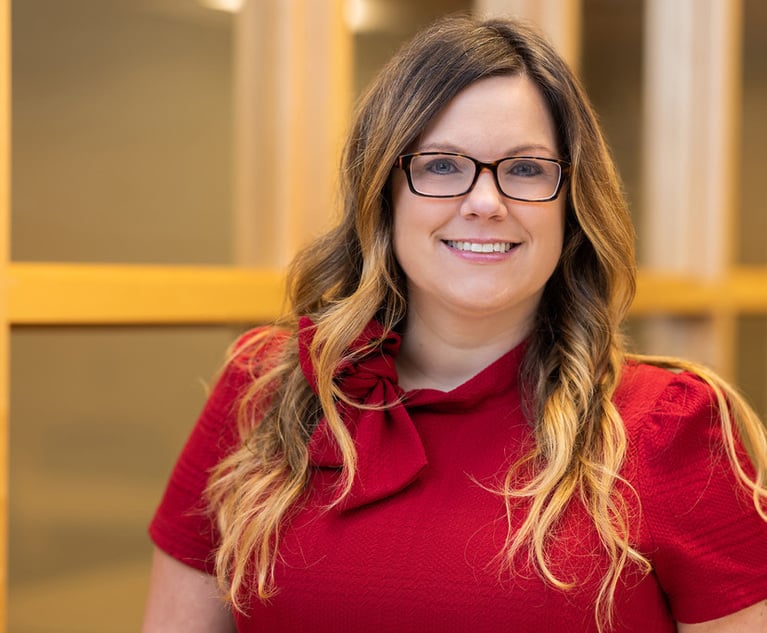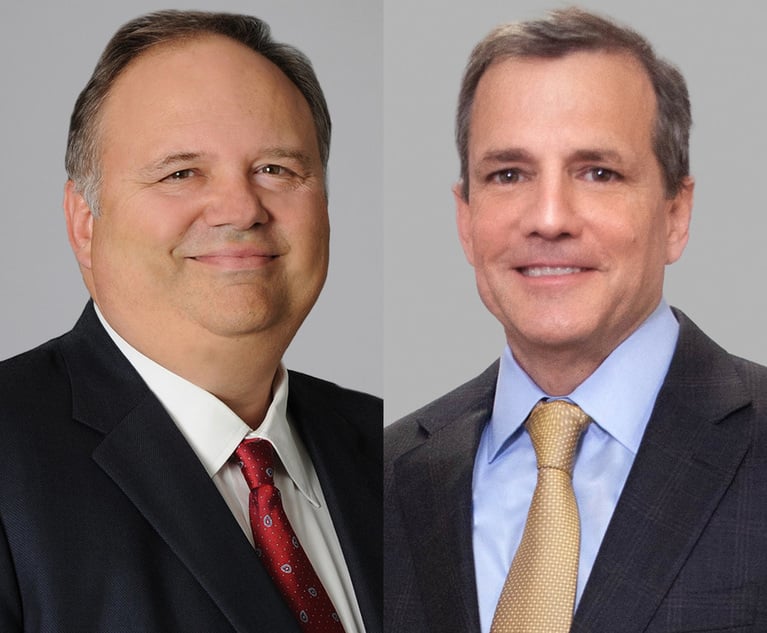 Photo: Shutterstock
Photo: ShutterstockDAs Across Nation File Brief Supporting Philadelphia's Safe Injection Site Plan
Reform-minded prosecutors lined up behind an amicus brief filed by lawyers from Wilmer and Philadelphia's Hangley Aronchick supporting a plan to set up safe injection sites as a public health measure, a plan that has drawn opposition from U.S. Attorney William McSwain.
July 10, 2019 at 02:10 PM
4 minute read
Top prosecutors from across the country, including New York, Texas, California and Massachusetts, have thrown their support behind a Philadelphia-based nonprofit's efforts to open the country's first safe injection site.
Attorneys from Wilmer Cutler Pickering Hale and Dorr and Hangley Aronchick Segal Pudlin & Schiller filed an amicus brief Wednesday on behalf of 64 current and former law enforcement officials, who contend that federal law should not bar the nonprofit Safehouse from opening a safe injection site. The brief was one of several filed Wednesday.
Among the current top prosecutors who signed onto the brief are Manhattan District Attorney Cyrus Vance, Brooklyn District Attorney Eric Gonzalez, Suffolk County District Attorney Rachael Rollins, Dallas County District Attorney John Creuzot, Cook County State's Attorney Kim Foxx, San Francisco District Attorney George Gascon and others. Philadelphia District Attorney Larry Krasner, who has long supported safe injection sites, also signed onto the brief.
“As law enforcement and criminal justice leaders, amici's objective is to maintain public safety; saving the lives and promoting the health of all members of the community is as central to that mission as preventing and prosecuting crimes,” the 27-page brief said.
The filing puts the prosecutors at odds with U.S. Attorney William McSwain of the Eastern District of Pennsylvania, who sued earlier this year seeking to bar the site.
READ THE BRIEF:
|McSwain's office filed a lawsuit in February, asking for a declaratory judgment that says safe injection sites—where heroin users can inject the drug under the supervision of medical staff—violate provisions of the Controlled Substances Act. The lawsuit is the first of its kind in the nation, and may presage the way federal prosecutors and courts will address an issue that is being debated in several cities across the country.
The Controlled Substances Act makes it illegal to “knowingly open, lease, rent, use, or maintain any place” for the use of controlled substances and has historically been used to prosecute houses where drugs were sold. The feds' suit specifically takes issue with Safehouse's stated plan to operate a “consumption room,” where medical staff would oversee heroin injections.
It is Safehouse's position that the site would help stem the recent increase of opioid-related deaths and reduce the spread of disease, but McSwain has contended that the site clearly violates the law. In announcing the lawsuit, he dismissed the notion that the law makes any distinction for doctors, nurses or others who do not sell drugs, but are there to provide medical oversight.
The case, United States v. Safehouse, has been assigned to U.S. District Judge Gerald McHugh. Although McHugh's decision is likely to apply just to the Eastern District of Pennsylvania, where the lawsuit was filed, it will undoubtedly have ramifications for other jurisdictions.
Numerous parties filed amicus briefs Wednesday, including several LGBT and public health advocacy groups, which supported Safehouse. A brief in support of the U.S. Attorney's Office was expected to be filed late Wednesday.
Ilana H. Eisenstein of DLA Piper is representing Safehouse. In an emailed statement, Eisenstein said the eight states, four cities and 134 individuals and organizations offering support in the 11 amici briefs set to be filed in support of the nonprofit was a “tangible demonstration of the broad community support.”
“We are grateful for the many individuals, organizations, and lawyers who have offered their own direct experiences and unique perspectives to explain how overdose prevention sites can mitigate the opioid and overdose crisis that has gripped Philadelphia and the nation,” Eisenstein said.
Regarding the prosecutors' amicus brief, the signers include both prosecutors and retired law enforcement officers. No current federal prosecutors signed onto the brief, but several former federal prosecutors, including former U.S. Attorneys Channing Phillips of the District of Columbia and Kenyen Brown of the Southern District of Alabama, signed onto the brief.
The brief contends that the Controlled Substances Act has never been used for prohibiting other health-related operations, such as syringe exchange facilities, or services providing naloxone, which is used to treat overdoses. The brief also contended that the sites, which it referred to as “overdose prevention sites,” led to fewer overdose death and helped mitigate the spread of disease.
“The class 'war on drugs' approach to drug control—an almost exclusive focus on aggressive enforcement of criminal law—has exacerbated the overdose epidemic,” the brief said. “This experience confirms that no jurisdiction can arrest its way out of this public health problem.”
The U.S. Attorney's Office declined to comment.
This content has been archived. It is available through our partners, LexisNexis® and Bloomberg Law.
To view this content, please continue to their sites.
Not a Lexis Subscriber?
Subscribe Now
Not a Bloomberg Law Subscriber?
Subscribe Now
NOT FOR REPRINT
© 2025 ALM Global, LLC, All Rights Reserved. Request academic re-use from www.copyright.com. All other uses, submit a request to [email protected]. For more information visit Asset & Logo Licensing.
You Might Like
View All


Baker & Hostetler Appoints New Office Leaders in Philadelphia, Chicago
5 minute read
Superior Court Rejects Pa. Hospital's Challenge to $7.3M Med Mal Judgment
3 minute readTrending Stories
- 1Judge Largely Blocks Tennessee's Porn Site Age Verification Law as Other States Enforce Theirs
- 2Divorce Timing Is Everything: Waiting for the New Year May Have Its Advantages
- 3Bracewell Adds Former Pioneer Natural Resources Lawyer to O&G, Energy Transition Practices
- 4Send Us Your New Partners for The Legal's 2025 New Partners Yearbook
- 5Another US Firm Shutters London Office
Who Got The Work
Michael G. Bongiorno, Andrew Scott Dulberg and Elizabeth E. Driscoll from Wilmer Cutler Pickering Hale and Dorr have stepped in to represent Symbotic Inc., an A.I.-enabled technology platform that focuses on increasing supply chain efficiency, and other defendants in a pending shareholder derivative lawsuit. The case, filed Oct. 2 in Massachusetts District Court by the Brown Law Firm on behalf of Stephen Austen, accuses certain officers and directors of misleading investors in regard to Symbotic's potential for margin growth by failing to disclose that the company was not equipped to timely deploy its systems or manage expenses through project delays. The case, assigned to U.S. District Judge Nathaniel M. Gorton, is 1:24-cv-12522, Austen v. Cohen et al.
Who Got The Work
Edmund Polubinski and Marie Killmond of Davis Polk & Wardwell have entered appearances for data platform software development company MongoDB and other defendants in a pending shareholder derivative lawsuit. The action, filed Oct. 7 in New York Southern District Court by the Brown Law Firm, accuses the company's directors and/or officers of falsely expressing confidence in the company’s restructuring of its sales incentive plan and downplaying the severity of decreases in its upfront commitments. The case is 1:24-cv-07594, Roy v. Ittycheria et al.
Who Got The Work
Amy O. Bruchs and Kurt F. Ellison of Michael Best & Friedrich have entered appearances for Epic Systems Corp. in a pending employment discrimination lawsuit. The suit was filed Sept. 7 in Wisconsin Western District Court by Levine Eisberner LLC and Siri & Glimstad on behalf of a project manager who claims that he was wrongfully terminated after applying for a religious exemption to the defendant's COVID-19 vaccine mandate. The case, assigned to U.S. Magistrate Judge Anita Marie Boor, is 3:24-cv-00630, Secker, Nathan v. Epic Systems Corporation.
Who Got The Work
David X. Sullivan, Thomas J. Finn and Gregory A. Hall from McCarter & English have entered appearances for Sunrun Installation Services in a pending civil rights lawsuit. The complaint was filed Sept. 4 in Connecticut District Court by attorney Robert M. Berke on behalf of former employee George Edward Steins, who was arrested and charged with employing an unregistered home improvement salesperson. The complaint alleges that had Sunrun informed the Connecticut Department of Consumer Protection that the plaintiff's employment had ended in 2017 and that he no longer held Sunrun's home improvement contractor license, he would not have been hit with charges, which were dismissed in May 2024. The case, assigned to U.S. District Judge Jeffrey A. Meyer, is 3:24-cv-01423, Steins v. Sunrun, Inc. et al.
Who Got The Work
Greenberg Traurig shareholder Joshua L. Raskin has entered an appearance for boohoo.com UK Ltd. in a pending patent infringement lawsuit. The suit, filed Sept. 3 in Texas Eastern District Court by Rozier Hardt McDonough on behalf of Alto Dynamics, asserts five patents related to an online shopping platform. The case, assigned to U.S. District Judge Rodney Gilstrap, is 2:24-cv-00719, Alto Dynamics, LLC v. boohoo.com UK Limited.
Featured Firms
Law Offices of Gary Martin Hays & Associates, P.C.
(470) 294-1674
Law Offices of Mark E. Salomone
(857) 444-6468
Smith & Hassler
(713) 739-1250





